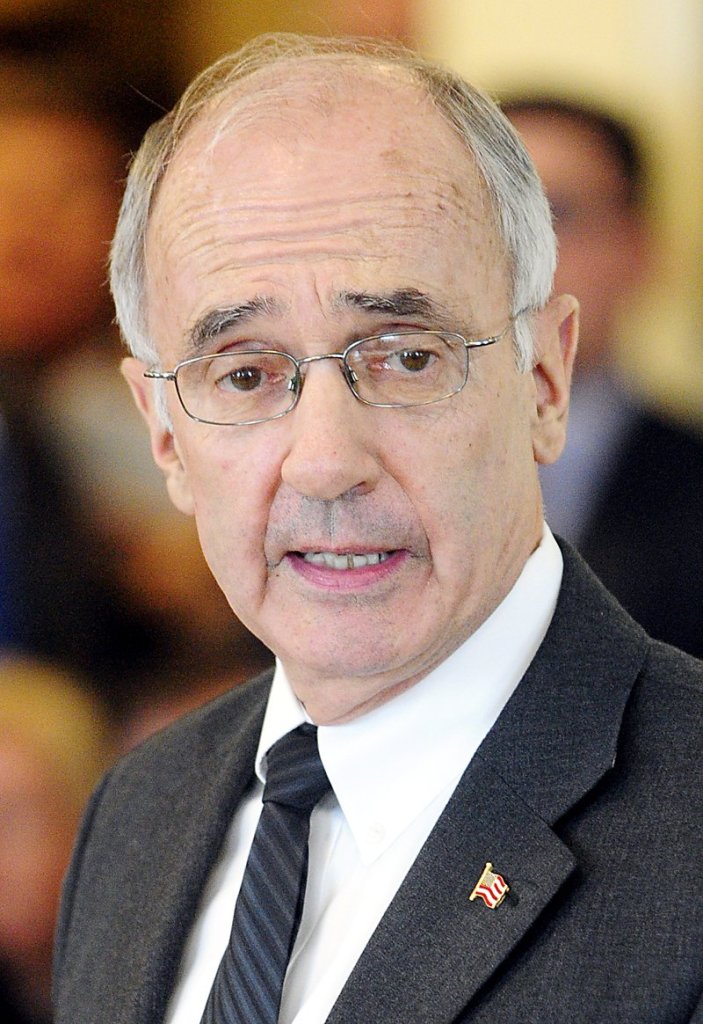AUGUSTA — Department of Environmental Protection Commissioner Darryl Brown resigned Wednesday morning after the Attorney General’s Office said he was “unqualified” to serve in the post under Maine law.
Gov. Paul LePage’s office announced that Darryl Brown would take over as director of the State Planning Office, which the governor’s proposed budget would disband by Jan. 1.
Questions about Brown’s eligibility for the DEP job, based on federal law, emerged in February just days after he was sworn in. As MaineToday Media reported in March, state law also appeared to call into question whether Brown was eligible.
Brown owns Main-Land Development Consultants, an environmental consulting firm with 12 employees based in Livermore Falls.
By state law, anyone who has received, in the two previous years, at least 10 percent of their income from clients who receive or apply for permits or licenses under the federal Clean Water Act may not be commissioner of the DEP.
The state law mirrors federal law, except a violation of the federal law doesn’t make a commissioner ineligible to serve, but results in a loss of federal permitting authority.
Maine Attorney General William Schneider issued a letter Wednesday that said it appeared Brown was ineligible.
Schneider’s letter said that if Brown couldn’t produce documents showing there was no conflict of interest, he would be unqualified to serve. That created a problem for Brown, because Schneider noted that any documents he provided would be considered public record.
Release of those records could hurt Brown’s business, which consults for other companies on land-use issues, said his personal attorney, L. Clinton Boothby.
Schneider wrote, “In the absence of any new information, it appears you are unqualified to serve as commissioner of the Department of Environmental Protection under Maine law.”
He said federal law allows a commissioner who serves in violation of the statute to recuse himself or herself, or delegate responsibilities for Clean Water Act permitting, but Maine law does not.
“If in fact such a conflict exists, it would undermine your legal authority to act on any matter coming before you as commissioner,” he wrote. “If a conflict were to exist, we are not aware of any mechanism that would allow you to continue to serve as commissioner.”
Brown retained Boothby after the Androscoggin River Alliance filed a complaint with the U.S. Environmental Protection Agency in February. A preliminary decision from the EPA was expected around May 1.
Earlier this month, Brown insisted that he was eligible, saying, “I am confident that I don’t exceed the 10 percent threshold.”
Brown said Wednesday that he was “obviously” wrong, but that Maine’s law is “silliness.”
“It truly is nothing more than silliness,” he said. “It precludes anybody with any kind of experience, and the kind of management that’s required at a department like the Department of Environmental Protection, to be left out of the process and not be able to be involved.”
Brown said he “has to believe” that many previous DEP commissioners served in violation of the law. Boothby raised that possibility in a letter to the EPA and the Attorney General’s Office.
In a press release detailing several personnel changes in his administration Wednesday, LePage criticized Maine’s law as “inflexible.” He said he has spoken with legislative leaders about changing it.
Brown and the DEP’s spokeswoman were critical of the attorney general’s action.
“The attorney general felt compelled to get the letter out, a huge disappointment for me. I don’t like to do business that way,” Brown said.
Samantha DePoy-Warren, spokeswoman for the DEP, said, “Why the attorney general released this letter is a mystery to us in the (DEP) and the governor’s office as well.”
DePoy-Warren said officials in the AG’s Office were “interjecting themselves” into an issue that was not pending before them and “acting independently.”
Democratic lawmakers had asked for Schneider’s opinion, but Schneider declined while the EPA issue was pending.
Environmental attorneys who had criticized Schneider for not looking into the issue sooner praised his action Wednesday.
“We called on the Attorney General’s Office to do a thorough and objective examination of the facts and to apply the law to those facts, and I think one has to recognize that the attorney general has done that,” said Sean Mahoney of the Conservation Law Foundation of Maine.
Steve Hinchman, a lawyer for the Androscoggin River Alliance, said “it’s a shame that it went on so long and it’s a shame that they didn’t do the proper analysis in the beginning.”
House Minority Leader Emily Cain, D-Orono, said she has been happy with the work Brown has done, but is glad the issue has been resolved.
“It alleviates a lot of questions and concerns that have been raised about potential issues with Commissioner Brown; I think it’s the right decision,” she said. “My hope is, as the governor searches for a new commissioner of DEP, they’ll look for someone who could really engage with the full potential of the department and not come with conflict for past work.”
Jim Brooks, director of the DEP’s Bureau of Air Quality, will serve as acting DEP commissioner, according to the governor’s news release. Brooks, a longtime DEP employee, was acting commissioner before Brown’s appointment.
LePage also announced Wednesday that he would nominate Robert Winglass, a former Marine officer who served in the Maine House, as commissioner of the Department of Labor.
The governor said he has appointed David Emery, a former Republican congressman from Maine, as deputy commissioner for the Department of Administrative and Financial Services.
State House Writer Tom Bell and The Associated Press contributed to this report.
MaineToday Media State House Writer Rebekah Metzler can be contacted at 620-7016 or at:
rmetzler@mainetoday.com
Send questions/comments to the editors.


